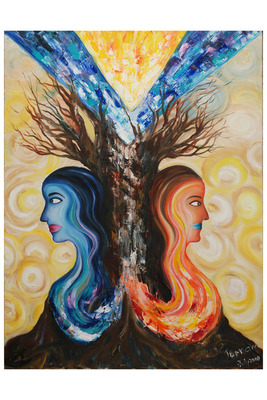COLLEGE FEMINISMS: Conversations With My Abuelita
By Guest Contributor on January 6, 2014By Isabel Hibbard
I like to think that I have helped my abuelita cope with the pain of her past, especially during her loneliest years in the United States, the mid 1990s. I was four years old and my parents were struggling to find their bearings in Boston as young parents; my abuelita left her home in Chile to live with us and help raise me while my parents worked full-time. She claims that I was almost bald when she saw me for the first time and this was because I wasn’t being fed well enough. All I would eat was pasta and bread, she recalls. So everyday, my abuelita would make me a sort of homemade baby food. She’d blend together vegetables, rice, beans, and meat, sit me on the countertop, and tell me stories while feeding me her superbly healthy concoctions. Although I was normally a picky eater, I ate all the food my abuelita gave me without a fuss while being mesmerized by her rendition of Caperucita Roja (Little Red Riding Hood) and stories of my mother when she was my age. My abuelita used her stories to both engage and distract me. She and I gradually became best friends during her first years back in Boston.
I remember she and I would walk to the Bodega everyday where she’d occasionally pick up a pack of Marlboro lights and a few groceries she needed to cook dinner. ¿Como se dice fósforo en inglés? “How do you say match in English?” she’d ask me. I refused to tell her in an attempt at getting her to quit smoking. I interpreted for her selectively, only translating when I felt like it. Sometimes, I felt like her personal guide through Gringo-land! Even at that age, I noticed that my abuelita and I needed each other in order to navigate the “white” world she had traveled to and I was born in. We were two little girls working through our newness. We both needed to learn how to be, and speak, in a new culture.
My abuelita was far away from her birthplace but one that no longer felt like home as the brutality of the dictatorship still looms two decades after its formal end. A pressure to be silent permeated, even after Chile’s transition to democracy, rooted in a denial of the past and fear of the future. In the United States, she struggled to communicate in a place that promotes intolerance and assimilation through the rejection of one’s roots. I, a multiracial gringa chilenita, was just beginning to note the stares my mother and I got as we walked together down the street, my white baby-faced cheek, pressed up against her brown chest. I was taught to be ashamed of my identity as I was ridiculed in school for speaking Spanglish because it wasn’t a real language. But it was in my abuelita that I found solace—she made me feel that I was all right, that living in my skin, its mixed hue, was all right.
I remember watching her methodically place dirty clothes from the hamper into the washing machine. She didn’t check the pockets of the pants like my mother. Abuelita, why don’t you check the pockets before putting them in the washing machine? What if there’s something in there? She shook her bowed head in response, I don’t check because I once found a mouse in the pocket of your grandfather’s pants. I created a vivid image in my mind from her words. My grandmother in her early twenties washing clothes, hunched over a basin in the yard of her home in Chile. She was married to her husband at the age of seventeen. At the beginning of the marriage, the young couple lived with his family while they saved up money to buy their own home. I don’t know much about my grandfather, but after overhearing stories around the kitchen table, ones not meant for children, I gleaned that he was a stern, serious man. My grandmother, who worked as a nurse at night, took care of the children and did all the housework during the day. I imagine her with arms outstretched, carefully hanging her damp uniform to dry overhead on a clothesline in a lush garden filled with lemon trees; her young children running around in circles, fighting for her attention as she reaches into the pocket of her husband’s pants. In my mind, this moment seems suspended in time, as she opens up her hand to reveal a small field mouse.
She lets out a piercing scream, flinging the mouse into the air. I fabricated this story based on the glimpse she offered me into her past, trying desperately to understand her life in Chile that seemed otherworldly and fairy-tale like to me. She did not finish the story until I was much older, filling in the details I had imagined for myself so clearly. In actuality, there was no mouse. There were no lemon trees. No comfortable household. The mouse was, in fact, a personal note that my grandfather did not want my abuelita to read. Once he found out she had seen the note, he hit her. This was not the first time he had punished her. He hit her in front of the children and until she feared him, beating her into silent obedience. It has taken me over twenty years to piece together the story of my abuelita and our family in Chile. Each recollection must be earned over time as I begin to weave together the fragments of her life’s narrative in an attempt to better understand myself through my ancestry and through the stories of the woman who raised me.
The stories my abuelita told me growing up, like the one about the mouse, change with each retelling. Sometimes, the details become clearer; other times, I cannot tell whether the memories have been distorted with time or perhaps altered as a coping mechanism to deal with the pain of remembering. As I get older, I learn about the complexity of identity, experience, and trauma. Some stories I gather during the “gossip” sessions between my mother and abuelita. Their voices drop to a whisper when they reminisce about times past that have become almost mythical to me growing up on the periphery of these conversations, like the story of my tia’s immaculate conception. Her young son passed away in an unexpected accident one summer. Prior to my cousin’s death, my tia had been trying to get pregnant but was told she’d never have children again. A few days after her son passed away, she found out she was pregnant with her first daughter. My mother and abuelita tell this part of the story over and over again, each time with the same enthusiasm and dewy-eyed looks as the first telling, documenting this special occasion forever in their oral narration.
As a young child, one of my cousins and I would sit under the kitchen table as my mother, aunt, and abuelita would talk for hours. They spoke in what to me sounded like a secret code. I didn’t know many of the people they were talking about and usually the topics of conversation were of little interest to me, like so-and-so’s depression or whoever’s failing relationship. But I did catch onto certain aspects, like the mmm’s, accompanied with pursed lips of disapproval, or the surprised ooh’s and the mmhmm’s signifying agreement. Under the table, I’d pick up on pieces of stories, like one about my uncle falling off the side of a truck when he was a teenager. She recalls the moment she heard he was in the hospital after the accident with a sense urgency and sharpness in her voice and as she talks about his process of recuperation, her voice softens, almost as if she were reliving the experience.
I have witnessed my abuelita’s telling of her histories since the age of four, sitting on a countertop and today, as a feminist scholar, I continue to absorb and record her accounts. With time, she has trusted me with her stories of abuse, struggle, love, and betrayal, relying on me to keep her memories alive when she no longer can. I view her stories through a metaphorical bifocal lens, those of a feminist and of an empathetic granddaughter, at times painfully relating to her narrative. I am now able to place her experience within a grander context, understanding how multiple identities interact simultaneously. She was never just a caretaker; she is also survivor of abuse, a resistor of social injustice, and most importantly, a story-teller. Oral histories highlight the plurality of identity as we move through the world code-switching and performing “us” in different temporal and physical spaces.
For my abuelita, the telling and retelling of stories serve multiple purposes. Through sharing and conversation, she comes to terms with painful experiences of the past, processing the events with the support of people who love her unconditionally. She tells these stories as a way of preservation—preservation of herself and of our family. Her stories are an oral history of the family. The emotion she uses to talk about her memories, the way she tells the stories, as well as the stories themselves, work together to construct a rich representation of our family, even though we reside on opposite sides of the continent. Through these recollections, I stay in touch with the side of my family I see infrequently and those I will never meet. For my abuelita and mother, these stories keep alive and honor an important part of their identities, as they fight against the feeling of displacement and isolation faced by those who have left their homelands. To me, our family lineage is not represented by names on the branches of genealogical tree. We are the stories of my abuelita and her six siblings growing up in Chile during the 1940s. We are the story of my mother as a rambunctious bully in elementary school and later as a revolutionary during la dictadura, the twenty-year long military dictatorship in Chile.
These encounters with my abuelita are feminist fiction and non-fiction at the same time. Feminist stories have the potential to formally validate the stories and experiences of women historically through documentation, countering the male-dominated, Eurocentric perspective that is overwhelmingly represented transnationally and widely recognized as the only “history.” By recording the stories of marginalized women in particular, history can be revised to include the voices of those historically oppressed; whose insight, wisdom, and knowledge provide the basis for social change.
The stories of those whose mere existence is an act of resistance in a world governed by white supremacist, capitalist, patriarchal forces, must be told and valued in academia but also on a personal level, as these stories inform identity and self-worth. The experience of listening and recording my abuelita’s stories has allowed me to express my deep respect for her as not only a contribution to the material history, but also as a form of mutual healing. As women, it somehow behooves us to listen to and sustain one another. Storytelling is one way to sustain, live, and prosper wherever we are. My abuelita, my mother, and I are testament to these truths of life.
__________________________________________
Isabel Hibbard is a Gender and Women’s Studies Major and Latin American Studies minor, graduating in the spring of 2014. She attended Boston Latin School for high school. At Connecticut College, she is an active member of Society Organized Against Racism (SOAR). She has organized campus-wide campaigns against racism including workshops, lectures, and teach-ins. She is also a member of an adult-youth collective based in New London, Connecticut and her long-term goal is building a youth-led movement for school change in the New London community. In the Gender and Women’s Studies department, she has been challenged to think critically about the world around her and to map the personal as political. The gender/ feminist lens is what she now uses to understand issues of social justice globally and locally. She writes, “The Gender and Women’s Studies department/ curriculum has helped me to develop powerful tools of critical thinking and self-reflexivity, indispensable for me as an activist, feminist, and citizen of the world, working towards transnational justice and equity.”
All Content ©2016 The Feminist Wire All Rights Reserved




1 Comment